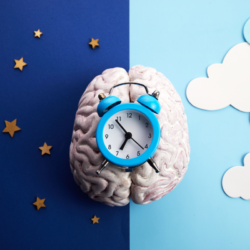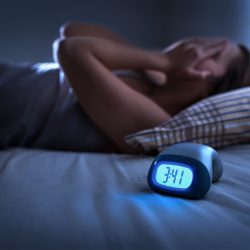In our never-ending quest for a restful night’s sleep, melatonin often presents itself as a promising solution. Produced naturally by the pineal gland, this essential hormone orchestrates our body’s circadian rhythm, regulating our sleep and wake cycles. The growing interest in melatonin as a potential treatment for sleep disorders has prompted a great deal of discussion and research, particularly into its interactions with other drugs, its use in pregnant women, and its effectiveness in managing night-time awakenings.
Finally, in this article we address the crucial question of whether it is safe to take melatonin and sleeping pills at the same time
Drug interactions and precautions to be taken with melatonin
Although melatonin is a natural hormone, it is not free from potential drug interactions. In fact, there are over 300 possible interactions with different drugs. These interactions may be particularly notable with alcohol or other drugs that induce drowsiness or dizziness. The concomitant use of melatonin with these substances should be approached with caution, or even avoided.
Medicines that may interact with melatonin
Melatonin, although beneficial for regulating sleep, requires particular attention when taken in conjunction with certain medicines. These interactions can not only affect the effectiveness of melatonin, but also increase the risk of side effects. It is important to note that many medicines can intensify or reduce the sedative effects of melatonin. Before taking melatonin, it is therefore essential to inform your doctor or pharmacist if you are taking any of the following medicines:
- Non-steroidal anti-inflammatory drugs (NSAIDs): Drugs that can affect the effectiveness of melatonin. Examples: ibuprofen, naproxen or diclofenac
- Sedatives and Hypnotics Benzodiazepines: commonly used to treat anxiety and sleep disorders, these drugs can increase the sedative effect of melatonin. Examples: temazepam, diazepam
- Sedative antihistamines: these drugs, such as diphenhydramine, are known to cause drowsiness and may interact with melatonin. Example: benadryl
- Opioid analgesics: Used to treat pain, these drugs can also increase the sedative effects of melatonin. Examples: codeine, morphine
- Muscle relaxants: These drugs, often prescribed to relieve muscle spasms, can increase the drowsiness induced by melatonin.
The list is much longer (antidepressants, hypotensives, oestrogens, psoralens, quinolones, etc.), which is why it is essential to tell your healthcare professional about any medical treatment before taking melatonin.
- Other herbs and supplements : Certain supplements such as 5-HTP, kava, and St John’s wort can also increase sedation when taken with melatonin.
Main risks involved
There are 2 main types of risk, mentioned below.
Risk of cognitive and coordination disorders
The elderly must be particularly vigilant when using melatonin. This population may experience impaired thinking, judgement and motor coordination. They may also experience increased drowsiness, which can affect any population.
Risk of bleeding
Melatonin may interact with anticoagulants such as warfarin, potentially increasing the risk of bleeding. It is essential to consult a doctor before combining melatonin with warfarin or other blood-thinning drugs.
Signs and symptoms of bleeding to watch out for when taking Melatonin with other treatments
- Unusual bleeding or bruising: An increased tendency to bleed may be a sign of drug interaction.
- Dizziness or lightheadedness: These symptoms may indicate an increased risk of internal bleeding.
- Black or tarry stools: This may indicate bleeding in the gastrointestinal tract.
- Coughing up or vomiting blood: The presence of blood resembling coffee grounds in vomit may be a sign of internal bleeding.
- Severe headache: An unusual or severe headache may be a sign of cerebral haemorrhage.
- General weakness: Sudden weakness may indicate severe internal bleeding.
Use of melatonin in the treatment of sleep disorders
Melatonin, commonly known as the sleep hormone, plays a key role in regulating the sleep-wake cycle. Its use in the treatment of sleep disorders has grown in popularity. Not least because of its less invasive nature compared with traditional sleeping pills.
Is melatonin more effective than a sleeping pill?
The effectiveness of melatonin in treating sleep disorders is well documented. Moreover, it has proved particularly useful in specific cases. Examples include jet lag, circadian rhythm disorders and sleep disorders associated with shift work. Melatonin helps to resynchronise the body’s internal biological clock, making it easier to fall asleep at more conventional times.
Melatonin can also be beneficial for people suffering from insomnia. This is particularly true of the elderly, where the natural production of melatonin tends to decline. Its use can often improve the quality of sleep and reduce the time it takes to fall asleep.
Sleep aid or melatonin, which should you choose?
Melatonin is generally considered to have fewer side effects than conventional sleeping pills. Sleeping pills, such as benzodiazepines or non-benzodiazepines, work by suppressing the activity of the central nervous system to induce sleep. This can often lead to dependence and side effects. These include daytime sleepiness, cognitive impairment and even poorer quality sleep.
Melatonin, on the other hand, works in harmony with the body’s natural rhythm. It is not addictive, and the risk of serious side effects is relatively low. What’s more, unlike many sleeping pills, melatonin generally has no residual sleepiness the next day.
Can melatonin and sleeping pills be taken at the same time?
The combined use of melatonin and sleeping pills, such as benzodiazepines, in the treatment of sleep disorders is the subject of research and analysis in the medical field. According to a systematic review and meta-analysis published on PubMed, taking melatonin showed no significant effect on the ability of participants to stop using benzodiazepines. Secondly, the impact of melatonin on sleep quality was inconsistent. It is important to note that these results do not completely rule out the potential role of melatonin in improving benzodiazepine discontinuation or sleep quality, due to the imprecise effect estimates.
Studies (2,3) highlight the importance of individual assessment by a healthcare professional before mixing melatonin with sleeping pills or other drugs. This is due to the complexity of possible interactions and the variable effects on different individuals.
Short-term vs long-term use of melatonin
The use of melatonin, a natural sleep-regulating hormone, varies according to whether it is used on a short-term or long-term basis. Its safety and effectiveness depend on the duration of use and the individual characteristics of each user.
Short-term use
Most adults generally consider short-term use of melatonin to be safe. It is frequently used to remedy specific sleep problems. Examples include jet lag or sleep disorders associated with shift work. Its recommended period of use is generally short, ranging from a few days to a few weeks. In these cases, melatonin can be useful in helping to realign the natural rhythm of sleep.
Long-term use
On the other hand, long-term use of melatonin can present additional challenges and risks. Although there is no clear consensus on the long-term safety of melatonin, some experts suggest that prolonged use could reduce its effectiveness and impact the body’s natural production of melatonin. The long-term effects of melatonin on hormonal processes, such as puberty and the menstrual cycle, are still poorly understood. These aspects continue to be actively studied as part of scientific research. It is therefore essential to seek the advice of a health professional before starting any prolonged treatment with melatonin. This precaution is all the more important if you are taking other medications or suffering from certain medical conditions.
Recommendations for responsible use of melatonin
- Medical consultation: before starting any melatonin-based treatment, whether short- or long-term, it is crucial to consult a healthcare professional to assess its suitability for your particular situation.
- Dosage: adapt the dosage of melatonin to the individual and the sleep problem encountered, starting with the lowest possible dose and adjusting it if necessary.
- Monitoring for side effects:although the side effects of melatonin are generally mild, it is important to monitor for any unusual reactions, such as headaches, dizziness or nausea.
- Watch out for drug interactions: melatonin can interact with certain medications.
- Assessing needs: instead of turning directly to melatonin, it may be beneficial to first examine the underlying causes of insomnia, such as anxiety or the side effects of medication. But it may also be worth considering lifestyle changes or cognitive behavioural therapies.
Pregnant women are advised not to use melatonin because there is insufficient evidence that it is safe.
Sources
- Anses opinion on the risks associated with the consumption of food supplements containing melatonin
- Fundam Clin Pharmacol. 2021 Feb;35(1):25-39. doi: 10.1111/fcp.12566. Epub 2020 Jun 21.
Melatonin and morphine: potential beneficial effects of co-use - J Pharm Pract. 2021 Feb;34(1):44-50. doi: 10.1177/0897190019851888. Epub 2019 Jun 25.
Comparison of Melatonin and Zolpidem for Sleep in an Academic Community Hospital: An Analysis of Patient Perception and Inpatient Outcomes - Drugs Aging. 2015 Dec;32(12):1009-18. doi: 10.1007/s40266-015-0322-5.
The Effect of Melatonin on Benzodiazepine Discontinuation and Sleep Quality in Adults Attempting to Discontinue Benzodiazepines. A Systematic Review and Meta-Analysis







